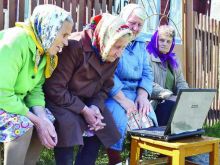Broadband Internet has been installed in the village of Stara Zburyivka in Hola Prystan raion of Kherson oblast. Head of the village council Viktor Maruniak told that a year and a half ago the village community decided to join the global network at any expense and by doing so to give the same opportunities to the young people in the village as their peers in other regions have.
“The fund of the village library is, of course, quite limited and our young people have to read the latest scientific and fiction books, communicate with peers online, and keep up with the time. A year and a half ago we opened the first Internet library in raion. For this purpose the village council allotted 40,000 hryvnias from the local budget. Five computers were purchased on that money. We found a local specialist who set up the Internet and led the institution. Since that time we have two libraries in one building: traditional one and a computer library,” Maruniak told The Day. “Until recently, I myself was computer illiterate and was especially afraid of the word ‘Internet.’ But this is a necessity of the modern time, therefore, every head of the village council in Ukraine must not only master this skill, but also encourage his fellow villagers to do the same. It turned out that the Internet in our library, as well as in the homes of the village residents, is too slow. Even the speed of the latest versions of mobile modems is not the best. However, it is technically impossible to connect to the ISP through a wire because since the Soviet times no special optical fiber wire was installed in the village.”
Therefore, the village community began to organize themselves in order to get the broadband Internet installed. There emerged an initiative group that consisted of deputies of the village council, representatives of the youth NGO “Dniprova Chaika,” and concerned residents of the village. To the first meeting the initiative group invited specialists from the Hola Prystan branch of “Ukrtelecom,” who assured the community that they were ready to install the cable and additional equipment. But the farmers had to purchase 4.5 kilometers of expensive cable.
“We contacted the PJSC ‘Odeskabel.’ They explained that the cost of the amount of cable that we needed was 50,000 hryvnias. After two weeks of negotiations by phone the company made concessions to us by reducing the cost to 29,000 hryvnias,” continued Maruniak. “However, the village budget did not have even that much money. That’s why the initiative group invited the fellow villagers to a meeting at the local House of Culture and asked everyone who wanted to have high-speed Internet to contribute to the cause. I was pleasantly surprised that over 200 people were willing to join the network at any cost right away. We divided the required amount of money by the number of those, who wanted to get connected to the Internet. People chipped in and we were able to purchase the cable.”
After the cable was installed in the village there were many who also wanted to get connected to the Internet. But at the next meeting of the initiative group its members decided unanimously that those villagers, who would connect to the Internet after the cable had been installed, would also have to pay. The village community decided that this money (so far the group gathered over 5,000 hryvnias) will be directed to the charity fund of the local school. This, in fact, allowed to have some basic renovation work done in the school.
“I am a regular reader of The Day. Once I came across the phrase said by the newspaper’s editor-in-chief Larysa Ivshyna: ‘The union of farms with high-speed internet is a real idea.’ Stara Zburyivka is a proof of that. Currently the village has been restarted. Young people use social networks, communicate with peers from different regions of the country and from abroad. They also learn foreign languages through the Internet. And people of my generation get objective information from the network and work on self-development. As a result, less and less people of those, who use Internet are watching TV now. People realize that there is practically now quality content in there. Today, Ukrainian village makes it clear how we can support ‘active’ Ukraine. Village armed with Internet can receive such ‘impulses’ much easier.”







